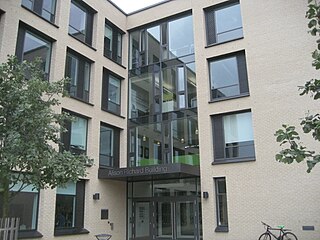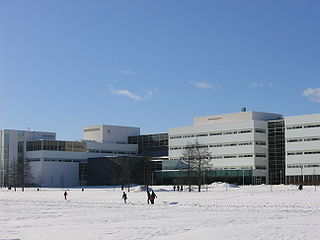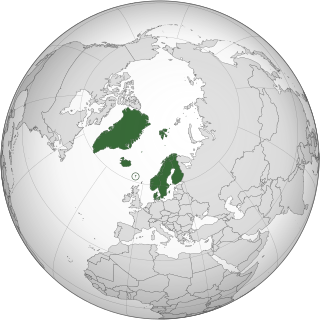Related Research Articles

The Nordic Council is the official body for formal inter-parliamentary Nordic cooperation among the Nordic countries. Formed in 1952, it has 87 representatives from Denmark, Finland, Iceland, Norway, and Sweden as well as from the autonomous areas of the Faroe Islands, Greenland, and Åland. The representatives are members of parliament in their respective countries or areas and are elected by those parliaments. The Council holds ordinary sessions each year in October/November and usually one extra session per year with a specific theme. The council's official languages are Danish, Finnish, Icelandic, Norwegian, and Swedish, though it uses only the mutually intelligible Scandinavian languages—Danish, Norwegian, and Swedish—as its working languages. These three comprise the first language of around 80% of the region's population and are learned as a second or foreign language by the remaining 20%.

The University of Akureyri was founded in 1987 in the town of Akureyri in the northeastern part of Iceland. It is today a school of health sciences, humanities and social science, and a school of business and science. Over 2000 students attended the university in the autumn semester of 2014, around half of them through flexible learning, making the university the largest provider of distance education in the country. The University of Akureyri coordinates with other Icelandic Universities to operate the University Centre of the Westfjords located in Ísafjörður, which operates two master's degrees, one in Coastal and Marine Management and the other in Marine Innovation. Additionally, The University of Akureyri coordinates with other Nordic Universities for the West Nordic Studies and Polar Law Masters programs.
Area studies are interdisciplinary fields of research and scholarship pertaining to particular geographical, national/federal, or cultural regions. The term exists primarily as a general description for what are, in the practice of scholarship, many heterogeneous fields of research, encompassing both the social sciences and the humanities. Typical area study programs involve international relations, strategic studies, history, political science, political economy, cultural studies, languages, geography, literature, and other related disciplines. In contrast to cultural studies, area studies often include diaspora and emigration from the area.

The Nordic Centre in India (NCI) is a consortium of leading universities and research institutions in Denmark, Finland, Iceland, Norway, and Sweden. It was established in 2001 with the objective to facilitate cooperation in research and higher education between the Nordic countries and India. Through academic exchange NCI seeks to strengthen Indo-Nordic ties and understanding.

Novosibirsk State University is a public research university located in Novosibirsk, Russia. The university was founded in 1958, on the principles of integration of education and science, early involvement of students with research activities and the engagement of leading scientists in its teaching programmes. As for 2022, Novosibirsk State University has 246th place in the rating of the QS World University Rankings.

The Louisiana Scholars' College at Northwestern State University, or "Scholars' College" as it is known by its students and faculty, is Louisiana's only designated four-year, selective-admissions honors college in the liberal arts and sciences.
The Canadian Federation for the Humanities and Social Sciences, also known as the Federation for the Humanities and Social Sciences, is a member-based organization and the national voice for researchers in the humanities and social sciences in Canada. Formed in 1996 through a merger of the Social Science Federation of Canada and the Canadian Federation for the Humanities, it is a non-profit charitable organization that represents more than 85,000 researchers in 81 scholarly associations, 80 universities and colleges, and 6 affiliates across the country.

The Academia Europaea is a pan-European Academy of Humanities, Letters, Law, and Sciences. The Academia was founded in 1988 as a functioning Europe-wide Academy that encompasses all fields of scholarly inquiry. It acts as co-ordinator of European interests in national research agencies.
The Institute for Social and Economic Change (ISEC) is a social science research institute in Bangalore, India. Founded in 1972, it is the largest among the 27 institutions supported by Indian Council of Social Science Research (ICSSR).

Mykolas Romeris University is an international university located with campuses in Vilnius and Kaunas, Lithuania.

The Association for Slavic, East European, and Eurasian Studies (ASEEES) is a scholarly society dedicated to the advancement of knowledge about the former Soviet Union and Eastern and Central Europe. The ASEEES supports teaching, research, and publication relating to the peoples and territories within this area.

The Centre for Research in the Arts, Social Sciences and Humanities (CRASSH) is an interdisciplinary research centre within the University of Cambridge. Founded in 2001, CRASSH came into being as a way to create interdisciplinary dialogue across the University’s many faculties and departments in the arts, social sciences, and humanities, as well as to build bridges with scientific subjects. It has now grown into one of the largest humanities institutes in the world and is a major presence in academic life in the UK. It serves at once to draw together disciplinary perspectives in Cambridge and to disseminate new ideas to audiences across Europe and beyond.

The Nordische Gesellschaft was an association founded in 1921, with the objective of strengthening German-Nordic cultural and political cooperation. It was based in Lübeck, Germany. The association had both German and Scandinavian members. After the Nazi Party's takeover of Germany in 1933, the Nordische Gesellschaft came under the control of Alfred Rosenberg. A new board was formed. Rosenberg's ambition was that the organization could be utilized for the Nazi cause. Heinrich Himmler became a member of the board.

The Agora Center is a separate institute at the University of Jyväskylä in Central Finland. By its nature, the Agora Center is interdisciplinary and networked. Its purpose is to conduct, coordinate, and administrate top-level research and development that relates to the knowledge society and which places emphasis on the human perspective. The research and development is conducted in the form of fixed-period projects in cooperation with the University of Jyväskylä’s other faculties and separate institutes, businesses, the public sector and other relevant parties. The Agora Center also promotes researcher training through its various research projects. One of the core missions of the Agora Center is to effectively combine research and development with education. The project staff includes a high number of students and post-graduate students.

Foreningen Norden, Föreningen Norden (Swedish), Norræna félagið (Icelandic), Norrøna Felagið (Faroese), Peqatigiiffik Nunat Avannarliit (Greenlandic) and Pohjola-Norden (Finnish), The Norden Associations, sometimes referred to as The Nordic Associations are non-governmental organisations in the Nordic countries promoting civil cooperation between the Nordic countries. Established since 1919, there are Norden Associations in Sweden, Norway, Denmark, Finland, Iceland, Greenland, the Faroe Islands and Åland. Since 1965 these national branches are grouped in an umbrella organisation Foreningene Nordens Forbund (FNF), The Confederation of Norden Associations. The co-operation between the Nordic countries include projects such as Nordjobb, Nordic Library Week and Norden at the Cinema.

Nossal High School, also referred to as Nossal or NHS, is a Government-funded co-educational academically selective secondary day school, located in the Melbourne suburb of Berwick, Victoria, Australia. The school is named after Sir Gustav Nossal, a prominent Australian immunologist and 2000 Australian of the Year.

The Nordic countries are a geographical and cultural region in Northern Europe and the North Atlantic. It includes the sovereign states of Denmark, Finland, Iceland, Norway and Sweden; the autonomous territories of the Faroe Islands and Greenland; and the autonomous region of Åland.
Within academia, the history of knowledge is the field covering the accumulated and known human knowledge created or discovered during the history of the world and its historic forms, focus, accumulation, bearers, impacts, mediations, distribution, applications, societal contexts, conditions and methods of production. It is related to, yet separate from, the history of science, the history of scholarship and the history of philosophy. The scope of the history of knowledge encompass all the discovered and created fields of human-derived knowledge such as logic, philosophy, mathematics, science, sociology, psychology and data mining.
Engineering studies is an interdisciplinary branch of social sciences and humanities devoted to the study of engineers and their activities, often considered a part of science and technology studies (STS), and intersecting with and drawing from engineering education research. Studying engineers refers among other to the history and the sociology of their profession, its institutionalization and organization, the social composition and structure of the population of engineers, their training, their trajectory, etc. A subfield is for instance Women in engineering. Studying engineering refers to the study of engineering activities and practices, their knowledge and ontologies, their role into the society, their engagement.

Nansen East-West Dialogue Academy NEWDAY is a 10-day summer school which takes place annually at Nansen Academy in Lillehammer, Norway.